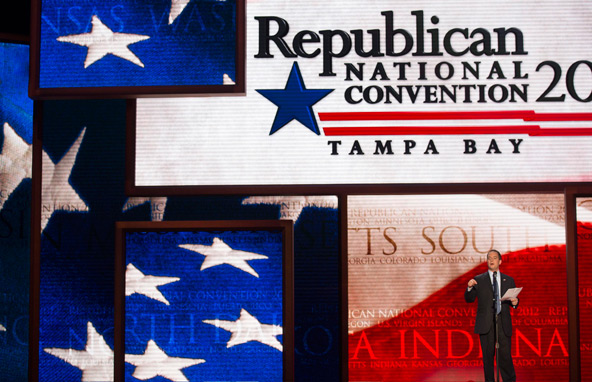
WASHINGTON (CNS) — The announcement that New York Cardinal Timothy M. Dolan would deliver a benediction at the Republican National Convention made him the latest in a long string of prelates to offer prayers at the major party conventions.
Joseph Zwilling, spokesman for the New York Archdiocese, said Aug. 23 that Cardinal Dolan accepted an invitation to offer the closing prayer at the Aug. 27-30 convention in Tampa, Fla. On the program for the evening, the benediction immediately follows the major address by former Massachusetts Gov. Mitt Romney, accepting the nomination for president. The convention is to be gaveled to a close after the prayer.
Greek Orthodox Archbishop Demetrios is scheduled to offer a benediction Aug. 29, and the Rev. Samuel Rodriguez, an Assembly of God minister who heads the National Hispanic Christian Leadership Conference, is scheduled to do the same on Aug. 27.
In his statement, Zwilling noted that the normal protocol would be for the local bishop to be invited to offer such a prayer, but that convention organizers approached Cardinal Dolan about doing it.
Zwilling said Cardinal Dolan contacted Bishop Robert N. Lynch of St. Petersburg, Fla., whose diocese includes Tampa. He gave the cardinal his approval and the cardinal accepted the invitation.
“It was made clear to the convention organizers, however, that the cardinal was coming only to pray, not to endorse,” Zwilling said, “and that he would be willing to accept a similar offer from the Democratic Party as well. That same sentiment was conveyed to the Democratic National Committee.”
The lineup of who might offer invocations and benedictions at the Democratic National Convention in Charlotte, N.C., Sept. 4-6, had not been announced as of Aug. 23.
In the past, bishops, priests and women religious have offered prayers at both parties’ conventions, as have clergy from many denominations.
In 2000, Cardinal Roger M. Mahony of Los Angeles opened the Democratic National Convention in his city with a prayer calling on delegates to be committed to protecting the life of all people, from unborn children and the elderly to those on skid row and death row.
The same year at the Philadelphia site of the GOP convention, Cardinal Anthony J. Bevilacqua offered the closing benediction in his home city.
At the 2008 conventions, neither Archbishop Charles J. Chaput of Denver nor Archbishop John C. Nienstedt of St. Paul-Minneapolis, Minn., participated in the Democratic and Republican conventions, respectively, in their cities. Archbishop Chaput said he was never approached about it and Archbishop Nienstedt said he declined.
Instead, Bishop Thomas G. Wenski of Orlando, Fla., now archbishop of Miami, offered a prayer at the GOP convention in St. Paul ,and Sister Catherine Pinkerton, a Sister of St. Joseph and lobbyist with the social justice organization Network, prayed at the Democratic convention.
The history of church leaders of many denominations praying at the party conventions goes back more than 100 years. Archbishop Demetrios is a perennial favorite, appearing at both parties’ conventions multiple times over the years.
In 1948, Philadelphia Cardinal Dennis J. Dougherty prayed with both parties when the nominating conventions met in Philadelphia.
The announcement about Cardinal Dolan’s participation at the convention comes just a week after he was criticized for inviting both President Barack Obama and Romney to participate in the Al Smith dinner, Oct. 18 in New York.
Cardinal Dolan defended the decision to invite both candidates in a blog post, noting: “An invitation to the Al Smith dinner is not an award, or the provision of a platform to expound views at odds with the church. It is an occasion of conversation; it is personal, not partisan.”






